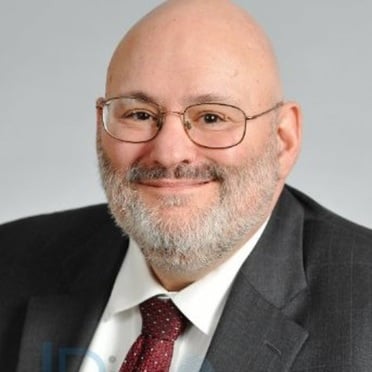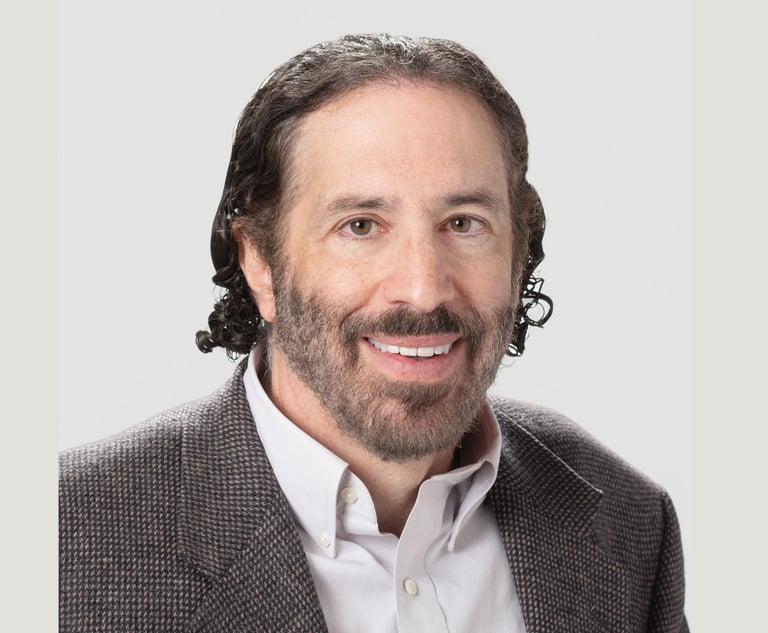What to Do When Technology Outpaces Legal Rules: Part 2
In Fox v. Smith, No. 1438, February term 2018 (C.P. Philadelphia, Aug. 30), Judge Arnold L. New held that, under current caselaw, a cause of action for defamation, false light and conspiracy could have proper venue in Philadelphia County because: the plaintiff, a Democrat, was running for mayor in Chester Heights, Delaware County, in the November 2017 election.
November 01, 2018 at 03:21 PM
7 minute read
 Leonard Deutchman
Leonard Deutchman
In Fox v. Smith, No. 1438, February term 2018 (C.P. Philadelphia, Aug. 30), Judge Arnold L. New held that, under current caselaw, a cause of action for defamation, false light and conspiracy could have proper venue in Philadelphia County because: the plaintiff, a Democrat, was running for mayor in Chester Heights, Delaware County, in the November 2017 election.
The court reasoned that, under prior, controlling caselaw, venue for a defamation claim can arise in a county where a defamatory statement is minimally circulated and recognized by one person to be defamatory even if that county is by no means the location where the statement was made or intended to be circulated and circulation in one or more other counties is considerably greater and the place or places the statement was intended to be circulated. In this week's column, I'll discuss the venue on the internet.
Venue on the Internet
The court observed that the “appellate courts of this commonwealth have not yet addressed the issue of where venue properly lies in cases arising out of defamation on the internet.” The court set out the positions of the plaintiff and various defendants. The plaintiff argued that the Pennsylvania Supreme Court's decision in Gaetano v. Sharon Herald, 231 A.2d 753, 755 (Pa. 1967), applied “to defamation on the internet in the same manner” it applied “to defamation in newspapers—the court must look to where the communication was received and understood to be defamatory.” Defendant Stacy Smith, by contrast, argued “the alleged defamation via the internet should not factor in the venue analysis because the defendants did not use the internet to aim the defamation at Philadelphia County; rather, the alleged defamatory information was aimed at Delaware County and the plaintiff's friends in Philadelphia used the internet” to “reach out to access the information, and the purpose of a defamation action is to vindicate a plaintiff's name in their community,” which was Chester Heights, Delaware County, not Philadelphia County. Defendants Ellen Luongo, Steven Luongo, Republican Committee of Chester Heights and Committee for the Future of Chester Heights additionally observed that if the plaintiff's position was accepted, “venue would be proper in all 67 counties in Pennsylvania because a friend/relative of the plaintiff could access the internet in any of Pennsylvania's counties.”
The court further noted that “federal courts who encountered this issue found the arguments advanced by the defendants to be persuasive, citing to the Middle District of Florida in Capital Corporation Merchant Banking v. Corporate Colocation, 2008 WL 4058014 *3 (M.D. Fla. Aug. 27, 2008), the Maryland District Court in Seidel v. Kirby, 296 F. Supp.3d 745, 753 (D.Md. 2017), the Southern District of Georgia in Eakin v. Rosen, 2015 WL 8757062 * 4-5 (S.D.G.A. Dec. 11, 2015), and the Eastern District of Missouri in Wieland v. John Rigby & Co. (Gunmakers), 2010 WL 1528527 *1-2 (April 2010) (venue was proper in Eastern District of Missouri because the plaintiff resided within the district).
Applying Gaetano to the instant matter, the court accepted the plaintiff's argument that her claim for defamation arose when her friend Kellie Clark read the alleged defamatory social media posts and visited the website while residing in Philadelphia. Therefore, under Pennsylvania law as set forth in Gaetano, venue is proper in Philadelphia because Philadelphia is where the defamatory statement was read and understood to be defamatory of the plaintiff. The court noted its role, i.e., that under “the principals of stare decisis, this court's function is to apply the law as it exists, not to make new law, citing Bugosh v. I.U. North America, 971 A.2d 1228, 1241 n.22, 1242 n.25 (Pa. 2009), in which Justice Thomas Saylor, dissenting, observed that “trial courts, as courts of general jurisdiction, are responsible for addressing the issues before them, while it is the duty of the appellate courts to make and refine the law,” and so held that Gaetano gave jurisdiction to Philadelphia County to decide a matter that was so obviously one which lay in Delaware County.
The court, however, requested that the appellate courts of Pennsylvania address the issue and hold differently. The court noted that in “the 51 years since Gaetano was decided, technology drastically changed the way in which we communicate, yet the venue rules related to defamation have remained stagnant,” and so “humbly” requested “a reevaluation of these principals in relationship to the internet, social media and the technology of the modern era.” The court cited to Judge Richard Posner's observation in Rosen v. Ciba-Geigy, 78 F.3d 316, 319 (7th Cir. 1996) that “the law lags science.”
Analysis
The court's criticism of applying Gaetano to defamation on the internet in the same manner it was applied to defamation in newspapers is simple. Unlike with physically transporting newspapers, the internet can easily send data around the world, thereby making the entire world potentially venue for a defamation action. Since the defamation action was under Pennsylvania law, however, jurisdiction would be limited to the commonwealth of Pennsylvania, but that still meant 66 counties other than Delaware, which was at the heart of the action, could be the venue for the action even though they had nothing to do with it other than one person having read the defamatory statements while in one of the 66 (postulated for the criticism, but actually taking place in the matter as it was claimed that friend Kellie Clark read the defamatory statements over the internet while she was in Philadelphia County). Thus, while venue over the action if the defamatory statements were read or heard in a county might have made sense many years ago, when to get such statements to the eyes or ears of those in that county constituted a great effort which showed the importance of that county to the matter, such a test for venue today is improper, since the ease with which the internet spreads data globally defeats the aged reasoning that the difficulty of spreading data indicates that the presence of the defamatory statement in a venue shows its importance to the venue and so makes that venue a proper location for the defamation action.
It is hard to take issue with the court's reasoning and criticism. The Gaetano test, which years ago would have confined jurisdiction to where the statement was created or widely circulated, now could create jurisdiction virtually anywhere the internet carries data, which means virtually anywhere. Application of Gaetano to a defamation action with federal jurisdiction would generally mean jurisdiction anywhere in the United States, as it would not be hard to identify one person in each district who read the defamatory statement in an internet setting. To state the outcomes of the test in the present day is to show why the test is no longer a good one.
Conclusion
One must find how the court dealt with its criticism as praiseworthy as the criticism itself. Notwithstanding that it recognized the flaws in Gaetano, it further recognized that, as a trial court, it lacked the authority to discard the decision. Thus, it held for the plaintiff under Gaetano and then invited the appellate courts to rethink their precedent and reverse the decision. The court, then, both respected its position and properly thought critically through the precedent, and so should win praise for both.
Leonard Deutchman is a legal consultant recently retired from one of the nation's largest e-discovery providers, KLDiscovery, where he was vice president,legal. Before joining KLDiscovery, he was a chief assistant district attorney at the Philadelphia District Attorney's Office, where he founded the Cyber Crime Unit and conducted and oversaw hundreds of long-term investigations involving cybercrime, fraud, drug trafficking and other offenses.
This content has been archived. It is available through our partners, LexisNexis® and Bloomberg Law.
To view this content, please continue to their sites.
Not a Lexis Subscriber?
Subscribe Now
Not a Bloomberg Law Subscriber?
Subscribe Now
NOT FOR REPRINT
© 2025 ALM Global, LLC, All Rights Reserved. Request academic re-use from www.copyright.com. All other uses, submit a request to [email protected]. For more information visit Asset & Logo Licensing.
You Might Like
View All
Pa. Superior Court Rules Pizza Chain Liable for Franchisee Driver's Crash
4 minute read
Patent Pending ... and Pending ... and Pending? Brace Yourself for Longer Waits
3 minute read
Boosting Litigation and Employee Benefits Practices, Two Am Law 100 Firms Grow in Pittsburgh
3 minute read
Harrisburg Jury Hands Up $1.5M Verdict to Teen Struck by Underinsured Driver
3 minute readTrending Stories
- 1Conversation Catalyst: Transforming Professional Advancement Through Strategic Dialogue
- 2Trump Taps McKinsey CLO Pierre Gentin for Commerce Department GC
- 3Critical Mass With Law.com's Amanda Bronstad: 700+ Residents Near Ohio Derailment File New Suit, Is the FAA to Blame For Last Month's Air Disasters?
- 4Law Journal Column on Marital Residence Sales in Pending Divorces Puts 'Misplaced' Reliance on Two Cases
- 5A Message to the Community: Meeting the Moment in 2025
Who Got The Work
J. Brugh Lower of Gibbons has entered an appearance for industrial equipment supplier Devco Corporation in a pending trademark infringement lawsuit. The suit, accusing the defendant of selling knock-off Graco products, was filed Dec. 18 in New Jersey District Court by Rivkin Radler on behalf of Graco Inc. and Graco Minnesota. The case, assigned to U.S. District Judge Zahid N. Quraishi, is 3:24-cv-11294, Graco Inc. et al v. Devco Corporation.
Who Got The Work
Rebecca Maller-Stein and Kent A. Yalowitz of Arnold & Porter Kaye Scholer have entered their appearances for Hanaco Venture Capital and its executives, Lior Prosor and David Frankel, in a pending securities lawsuit. The action, filed on Dec. 24 in New York Southern District Court by Zell, Aron & Co. on behalf of Goldeneye Advisors, accuses the defendants of negligently and fraudulently managing the plaintiff's $1 million investment. The case, assigned to U.S. District Judge Vernon S. Broderick, is 1:24-cv-09918, Goldeneye Advisors, LLC v. Hanaco Venture Capital, Ltd. et al.
Who Got The Work
Attorneys from A&O Shearman has stepped in as defense counsel for Toronto-Dominion Bank and other defendants in a pending securities class action. The suit, filed Dec. 11 in New York Southern District Court by Bleichmar Fonti & Auld, accuses the defendants of concealing the bank's 'pervasive' deficiencies in regards to its compliance with the Bank Secrecy Act and the quality of its anti-money laundering controls. The case, assigned to U.S. District Judge Arun Subramanian, is 1:24-cv-09445, Gonzalez v. The Toronto-Dominion Bank et al.
Who Got The Work
Crown Castle International, a Pennsylvania company providing shared communications infrastructure, has turned to Luke D. Wolf of Gordon Rees Scully Mansukhani to fend off a pending breach-of-contract lawsuit. The court action, filed Nov. 25 in Michigan Eastern District Court by Hooper Hathaway PC on behalf of The Town Residences LLC, accuses Crown Castle of failing to transfer approximately $30,000 in utility payments from T-Mobile in breach of a roof-top lease and assignment agreement. The case, assigned to U.S. District Judge Susan K. Declercq, is 2:24-cv-13131, The Town Residences LLC v. T-Mobile US, Inc. et al.
Who Got The Work
Wilfred P. Coronato and Daniel M. Schwartz of McCarter & English have stepped in as defense counsel to Electrolux Home Products Inc. in a pending product liability lawsuit. The court action, filed Nov. 26 in New York Eastern District Court by Poulos Lopiccolo PC and Nagel Rice LLP on behalf of David Stern, alleges that the defendant's refrigerators’ drawers and shelving repeatedly break and fall apart within months after purchase. The case, assigned to U.S. District Judge Joan M. Azrack, is 2:24-cv-08204, Stern v. Electrolux Home Products, Inc.
Featured Firms
Law Offices of Gary Martin Hays & Associates, P.C.
(470) 294-1674
Law Offices of Mark E. Salomone
(857) 444-6468
Smith & Hassler
(713) 739-1250





